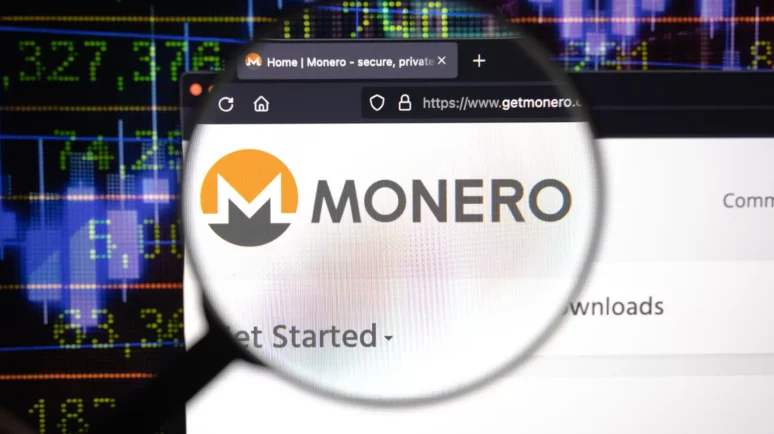Monero In Trouble? LocalMonero Shuts, Privacy Coin Crackdown, Just $48M Traded on Blockchain in 24 Hours

Regulatory pressure is squeezing Monero. | Credit: Pixabay
Key Takeaways
- Regulatory pressure on privacy coins hits platforms like LocalMonero, reducing trading volume.
- Monero’s privacy attracts both legitimate and illicit users in dark markets and extremist circles.
- While its privacy features remain a draw, its adoption is hindered by regulatory hurdles and liquidity challenges.
XMR trading platform LocalMonero will close later this Month. It attributed the decision to a combination of internal and external factors. This move comes during a broader regulatory crackdown on privacy-focused cryptocurrencies, such as XMR. This, in turn, has placed increased pressure on platforms dealing with such assets.
A crackdown on the Monero privacy coin has resulted in just $48.3 million being traded on its blockchain in a 24-hours period.
Privacy Platform LocalMonero Shuts Down Amid Regulatory Scrutiny
LocalMonero joined a growing trend of shutdowns and legal pressures faced by crypto privacy services. On May 7, the platform immediately stopped new signups and adverts for Monero trades. Trading on the platform will be completely disabled by May 14.

LocalMonero also said it would permanently shut down its website on November 7. Users have been urged to withdraw any remaining funds from their wallets by this date to avoid their funds being considered abandoned, emphasizing the urgency for users to act to secure their assets.
The platform, which was launched in 2017 as the XMR equivalent of LocalBitcoins, acknowledged that the Monero ecosystem has matured a lot over the years.
The team added that the imminent launch of decentralized exchanges such as Haveno and Serai and a recently announced privacy update called Full-Chain Membership Proofs (FCMPs) gives them confidence that Monero’s future is bright, “with or without our platform”.
However, regulatory actions targeting the Monero privacy coin have significantly affected its trading volume. Over the course of a single 24-hour period, only $48,4 million worth of Monero traded on the blockchain, a starkly low figure compared to typical trading volumes.
In order to compare, over the same time period, Bitcoin had $24.8 billion traded, while Ethereum traded around $10.4 billion. Other altcoins such as Solana and XRP traded $2.2 billion and $9.2 million respectively. In comparison with other privacy coins, Monero did OK. Dash traded around $37 million, Verge around $125 million and ZCash around $47 million.
Monero Dominates Privacy Coin Market with $2.8 Billion Cap
Since its launch in 2014, Monero grew, hitting a market cap of nearly $2.8 billion in May 2023. This places it well ahead of other privacy-focused cryptos such as Zcash and Dash. These which have market caps of approximately $600 million and $550 million respectively.
Throughout its history, Monero has been part of roughly 32 million XMR transactions . In 2022 alone, there were about 8.6 million transactions in XMR, a slight decrease from the peak of 8.8 million transactions in 2021. In contrast, Bitcoin, the leading cryptocurrency by market cap, had nearly 800 million transactions during the same period. Monero’s usage was active, although it still lagged behind Bitcoin in overall transaction volume. This is, at least in part, because of its more specialized role.

Bytecoin and Monero: The First Wave of Privacy-Focused Cryptocurrencies
In 2013, a developer operating under the pseudonym Nicholas van Saberhagen published the CryptoNote white paper . In it, he said that “privacy and anonymity are the most important aspects of electronic cash”. This document captured the attention of Bitcoin developers, including Gregory Maxwell and Andrew Poelstra, who were inspired to write a follow-up paper exploring the effects of integrating privacy and anonymity-enhancing features into existing cryptocurrencies.
Building on the foundational concepts outlined in the CryptoNote white paper, other developers went on to create Bytecoin, the first private cryptocurrency. The ideas in CryptoNote also served as a springboard for the development of Monero. This emerged as the first example of a new blockchain specifically designed to enhance privacy and anonymity.
“Thankful_for_today,” an anonymous user on the Bitcointalk forum, used Bytecoin’s codebase to develop a fork initially called BitMonero. This direction, however, faced opposition from the community, leading to another fork of the blockchain, which was subsequently named Monero, “coin” in Esperanto. Nearly a decade later, Monero (XMR) has become the leading privacy coin by market cap.
Extremists and Kidnappers Turn to Monero for Untraceable Transactions
Monero has, along with the likes of XRP, BCH and Litecoin, recently been called a ‘zombie coin ‘. However, it was everything but that until relatively recently. It gained popularity among darknet markets due to its privacy features, which significantly reduce traceability. For example, White House Market, one of the busiest darknet markets before its 2021 shutdown, initially encouraged its users to switch from Bitcoin to Monero for transactions. Eventually, it moved to exclusively accept Monero. Likewise, other darknet markets, such as AlphaBay and Archetyp have adopted similar practices.
Also, two of the most active darknet markets, The Versus Project and ASAP, currently accept Monero as a form of payment . This choice showcases Monero’s popularity in environments that prioritize privacy. Both markets offer a wide range of illicit goods, including hard drugs, malware, stolen account credentials, and other illegal items.

Extremist Telegram Channel Promotes Monero
In early 2021, a Telegram channel known for disseminating violent extremist-related content posted a graphic and accompanying text that advocated for the use of Monero. This channel, which had previously circulated a 34-page document titled “Cryptocurrency – A Privacy & Security Goys [non-Jew] Practical Guide,” promoted Monero because of to its strong privacy features.
In 2019, the kidnapping of a wealthy businessman’s wife in Norway highlighted a significant shift in ransom demands. Norwegian police said the kidnappers requested a ransom in cryptocurrency. The Norwegian press reported the demanded payment was specifically in Monero .
However, despite this shift towards more privacy-centric cryptocurrencies, Bitcoin remains the most widely used digital currency in darknet markets, underlining its enduring presence and utility in less regulated sectors of the internet.
Monero Faces Bans and Delistings as Regulators Crack Down on Privacy Coins
Monero, known for its strong privacy features, has become a focal point in discussions around the regulation and potential banning of privacy coins. According to the newest Chainalysis report , several major global economies have taken steps to limit or ban Monero from cryptocurrency exchanges due to concerns about its use in money laundering and organized crime.
For instance, Japan and South Korea have already implemented bans on Monero to address these issues. In 2020, Australian regulators and banks reportedly pressured local cryptocurrency exchanges to delist XMR or face the risk of being cut off from banking services.
Dubai has also joined this trend, prohibiting the use of Monero under its new digital asset regulations. The heightened scrutiny has prompted several cryptocurrency exchanges to cease supporting Monero. Notable examples include Binance, Bittrex , BitBay , and Huobi (HTX). Additionally, US-based cryptocurrency exchange Kraken discontinued Monero services for its UK customers in 2021.
What It Means To Be Called a Privacy Coin?
Privacy coins like Monero are technically classified as anonymity-enhanced cryptocurrencies (AECs). Monero stands out as the most prominent and valuable among these, with others like ZCash (ZEC), Oasis Network (ROSE), Secret (SCR), and Decred (DCR) also playing significant roles in this niche market.
Monero’s design and operational philosophy center on three foundational values – security, privacy, and decentralization.
The website states :
“Monero takes privacy seriously. Monero needs to be able to protect users in a court of law and, in extreme cases, from the death penalty. This level of privacy must be completely accessible to all users, whether they are technologically competent or have no idea how Monero works. A user needs to confidently trust Monero in a way that this person does not feel pressured into changing their spending habits for risk of others finding out.”
Monero’s Future Uncertain Amidst Regulatory Scrutiny
While Monero is favored by users seeking to enhance privacy, its adoption has not scaled as extensively as one might expect. A significant limiting factor is Monero’s lower liquidity relative to other cryptocurrencies. This makes carrying out large transactions harder. Additionally, regulatory uncertainty and outright bans have impeded its wider accessibility and use.
Comment
byu/johnfoss68 from discussion
inMonero
It’s also important to remember that, like all cryptocurrencies, Monero operates on an immutable ledger. This means that while the transactions themselves are obscured, the fact that they occur remains permanently recorded.


